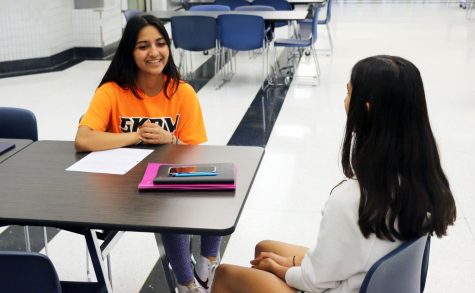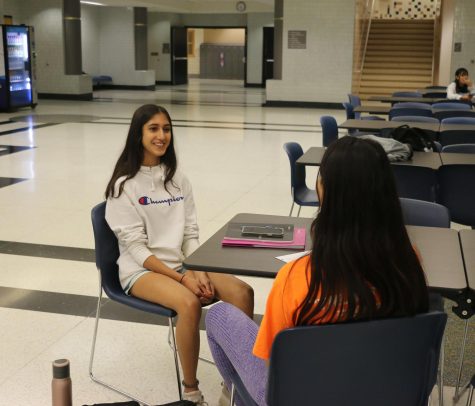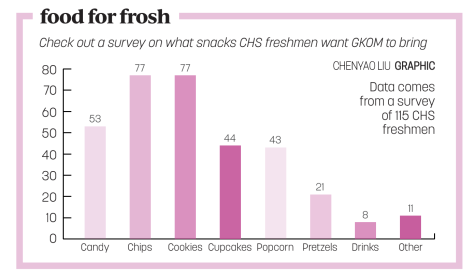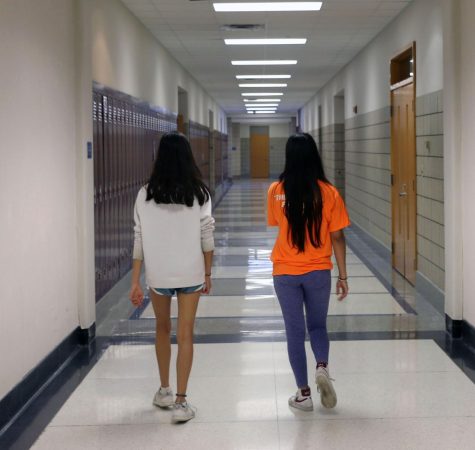
When freshman Naina Jakhar entered high school a mere few weeks ago, she said she faced a massive change of environment and was engulfed by a sea of emotions.
“I was nervous about coming into high school. I had no idea how I would get around or find my classes. The idea of having classes with upperclassmen terrified me,” Jakhar said. “I’m glad CHS has mentors to guide us a bit.”
The “mentors” Jakhar referenced are the Greyhound Kickoff Mentors (GKOM), upperclassmen who have been helping freshmen ease into the new environment of high school for years.
Ryan Ringenberg, head of the GKOM program, said the mentorship program lets freshmen feel connected to the school’s culture.
“The program just provides a few friendly faces around the school for freshmen,” Ringenberg said. “It makes the school seem a bit smaller and more comfortable.”
Jakhar said she was grateful for the GKOM program.

“(The GKOMs) provide a welcoming environment and someone we can go to for help. I would say that they make school seem like a more friendly environment, and it’s comforting to know that we have someone to go to when we are confused or don’t know what to do or don’t know a place, or just feel lost,” Jakhar said. “I don’t know where I would be without them right now.”
Danielle Evans, a psychologist at the University of Sussex, said the transition to high school is one of the most stressful events of a young adolescent’s life.
“One in four children and adolescents display signs of a mental health difficulty, with up to three children in every classroom experiencing a mental health issue that can be treated,” Evans said via email.
Jakhar said, “One of my fears about coming into high school was how hard my classes would be. And that fear proved true; I am already so stressed out from the classes I am taking this year.”
GKOM and junior Sehej Aurora said she tries to help freshmen deal with these issues as much as possible.
“We try to provide a fun release for students during SSRT. School, especially freshmen year, can be so stressful. For freshmen, they are still adjusting to high school, and most of the time, (there is) a significant change in workload,” Aurora said.

Aurora said she has a few tactics she tends to utilize to help freshmen feel a little more at ease.
“I try to become friends with the freshmen and make SSRTs a fun environment, like when we bring snacks or play games,” Aurora said. “High school is just so much different from middle school. I remember when I was a freshman, it just felt like such a massive change, and I was so nervous. So, I try to make it better for freshmen now, when I can.”
But, mentor programs like GKOM should continue to evolve as students’ needs change, according to Evans. For example, in addition to helping student transition to classes and workloads, Evans said it’s essential to focus on mental health.
“Schools could provide transition strategies that focus on children’s worries such as being lost or being bullied,” Evans said. “In addition, schools could teach topics that can be carried on from primary to secondary education to help with the interruption of achievement.”

(Devyn Sapper)
Aurora said she also has solutions in mind, angled toward improving the GKOM program.
“A little bit more organization and planning regarding the sessions could sort any sort of confusion and just overall make it a much better process and time for the freshmen,” Aurora said. “Our goal right now is just to help the freshmen easily transition into high school.”
But no program is perfect, and freshmen like Jahkar said they still often feel confused and not completely settled in.
“I sort of miss the halls of the middle school. Everything was so easy to navigate, and everything is just bigger and bolder here. Sometimes you just feel a little out of place,” Jakhar said. “But, with the help of my GKOMs, I have been adjusting to high school, and it’s really not too scary at all.”































![What happened to theater etiquette? [opinion]](https://hilite.org/wp-content/uploads/2025/04/Entertainment-Perspective-Cover-1200x471.jpg)













































![Review: “The Immortal Soul Salvage Yard:” A criminally underrated poetry collection [MUSE]](https://hilite.org/wp-content/uploads/2025/03/71cju6TvqmL._AC_UF10001000_QL80_.jpg)
![Review: "Dog Man" is Unapologetically Chaotic [MUSE]](https://hilite.org/wp-content/uploads/2025/03/dogman-1200x700.jpg)
![Review: "Ne Zha 2": The WeChat family reunion I didn’t know I needed [MUSE]](https://hilite.org/wp-content/uploads/2025/03/unnamed-4.png)
![Review in Print: Maripaz Villar brings a delightfully unique style to the world of WEBTOON [MUSE]](https://hilite.org/wp-content/uploads/2023/12/maripazcover-1200x960.jpg)
![Review: “The Sword of Kaigen” is a masterpiece [MUSE]](https://hilite.org/wp-content/uploads/2023/11/Screenshot-2023-11-26-201051.png)
![Review: Gateron Oil Kings, great linear switches, okay price [MUSE]](https://hilite.org/wp-content/uploads/2023/11/Screenshot-2023-11-26-200553.png)
![Review: “A Haunting in Venice” is a significant improvement from other Agatha Christie adaptations [MUSE]](https://hilite.org/wp-content/uploads/2023/11/e7ee2938a6d422669771bce6d8088521.jpg)
![Review: A Thanksgiving story from elementary school, still just as interesting [MUSE]](https://hilite.org/wp-content/uploads/2023/11/Screenshot-2023-11-26-195514-987x1200.png)
![Review: "When I Fly Towards You", cute, uplifting youth drama [MUSE]](https://hilite.org/wp-content/uploads/2023/09/When-I-Fly-Towards-You-Chinese-drama.png)
![Postcards from Muse: Hawaii Travel Diary [MUSE]](https://hilite.org/wp-content/uploads/2023/09/My-project-1-1200x1200.jpg)
![Review: "Ladybug & Cat Noir: The Movie," departure from original show [MUSE]](https://hilite.org/wp-content/uploads/2023/09/Ladybug__Cat_Noir_-_The_Movie_poster.jpg)
![Review in Print: "Hidden Love" is the cute, uplifting drama everyone needs [MUSE]](https://hilite.org/wp-content/uploads/2023/09/hiddenlovecover-e1693597208225-1030x1200.png)
![Review in Print: "Heartstopper" is the heartwarming queer romance we all need [MUSE]](https://hilite.org/wp-content/uploads/2023/08/museheartstoppercover-1200x654.png)


